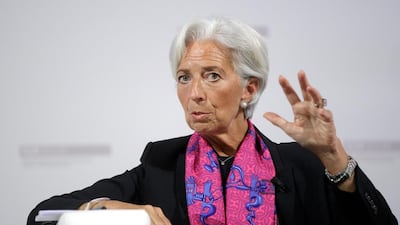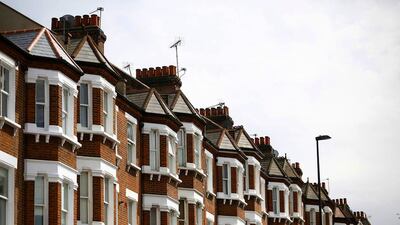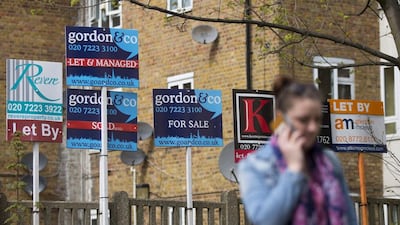A vote by Britain to leave the EU on June 23, the IMF predicts, will lead to a recession in the United Kingdom.
Christine Lagarde, the fund’s chief, said recently that the possible economic outcomes for the UK of a vote to leave, or Brexit, range from “pretty bad to very, very bad”.
But what about the impact on the Middle East? The UAE is the UK’s fourth-largest export destination, with UAE residents buying £1.6 billion (Dh8.63bn) in British goods in the year to April 2016, according to data from the UK’s Revenue and Customs, the British tax authority. Saudi Arabia follows close behind, as the sixth-largest export destination for British goods outside the EU. Collectively, these countries account for 9 per cent of British exports.
Still, Jason Tuvey, an emerging markets economist at Capital Economist, thinks a Brexit would have little effect on trade ties between the UK and the Arabian Gulf. “Trade ties aren’t exactly huge, and goods mainly go one way – from the UK to the GCC.” What might happen is that investment from UAE sovereign wealth funds and private investors dries up, he says. “But that depends on how much of that investment is dependent on the EU.”
For Gulf investors and sovereign wealth funds, that means investment in London property in particular. UAE buyers accounted for about 20 per cent of UK buy-to-let property sales in 2015, according to the estate brokerage Chestertons.
For foreign investors, especially those exposed to real estate, the value of the pound is important.
With the currency sliding this year, some are “thinking that [London] is starting to look relatively cheap compared to a year ago”, says Faisal Durrani, the head of research at the estate agents Cluttons.
A Brexit vote could also produce sudden changes in exchange rates, which would appeal to property investors thinking about currencies, he believes. “In the event of Brexit, there are forecasts for the pound between no change, to 30 per cent fall in the 24 hours after the vote. There will be a lot of opportunistic investors seeing London look exceptionally cheap compared to the past few years.”
For cash-rich sovereign wealth funds, this might be a good time to increase positions in the UK, Mr Tuvey reckons. “If the pound falls, some Gulf states might see the opportunity to buy up cheap assets.”
Anthony Harris, who was the UK’s ambassador to the UAE between 1998 and 2003, is currently trying to sell his house in London. But the EU referendum has made that more difficult.
“When I do sell it I’m going to get stuffed,” he says. “I’m not expecting sympathy for this – but it is a fact of life. We wait to see what effect the referendum will have on house prices, but I’m pretty pessimistic. The London market has gone completely flat. There are no transactions and foreigners have stopped buying.”
Foreign buyers believe “that sterling [will be] worth at least 10 per cent less” if Britain votes to leave, Mr Harris says – which is why they are holding off.
Leaving the EU will change how Middle East investors see the UK, he adds. “When I was young, every Arab who did well in business bought a flat on the Edgware Road, but it’s more complicated now. A vote to Leave wouldn’t dramatically affect that, but it would contribute to this overall impression that Britain is less interested in the rest of the world and is somehow a shrinking force in international affairs.”
It is a question of Britain’s global influence, not a matter of direct economic impact, Mr Harris says. “I don’t see the Leave vote having a major practical effect – British ministers will say that the UK is not reneging on its international obligations. The main impact is to accelerate the risk that Britain is seen as a declining power and to diminish our influence here and everywhere else.”
David Burns, a British businessman in Dubai who favours leaving the EU, believes that the Middle East may benefit as UK companies used to trading with the EU look further afield. There might be “a big push for UK investment to move into the UAE”, he says. “Those trading companies that are currently trading with Europe, will they move to the UAE? That could be an advantage for British business here.”
The nature of the European organisation has changed since its inception, and the EU has outgrown its initial purpose, Mr Burns believes.
“I won’t personally be affected by Brexit, but I’m old enough to remember the original treaties, and I remember the arguments against joining. You had six founding nations who, at the time of the founding of the EU, had the same standard of living, spoke the same languages, had a common history, experienced the same weather. But now we have 28 countries, they don’t all have the same moral compass and they don’t have the same ethical principles as the founding six.”
Mr Burns says he thinks that much of the criticism of the Brexit case is overblown. “In my own industry, accountancy, 19 out of top 20 audit firms have their headquarters in London. We are the world’s shopkeepers and accountants,” he says, citing also the use of UK law in the Dubai International Financial Center.
“Leaving the EU isn’t going to make people say we’re not going to use UK common law. The role of the UK on the greater world stage is not going to be diminished by an iota.”
Most of the economic argument has focused on the Single Market, the EU institution that is an attempt to economically integrate the countries of Europe into a single economic area. More thorough than a customs union or trade agreement, the Single Market sees European countries agree on regulations collectively in order to reduce “behind-the-borders” restrictions on trade between EU countries.
Economists’ estimates of the harm that Brexit will cause the EU are based on a shift from this trading relationship to one in which the UK’s regulations differ from those of the EU and therefore that it must renegotiate a trade deal – one with less far-reaching regulatory harmonisation than that required in the Single Market.
The Leave campaign wants to “Take Back Control” – and that means setting regulations at home, even if they clash with European regulations that ought to make everyone – including Britain – better off. It is also why there has been a strong consensus among economists that the economic impact of leaving the EU will be negative. Easier trade between EU members makes them better off, economists reckon – and imposing new barriers to economic activity between these states will not make any of them better off.
Calling the vote, even with just 24 hours to go, is practically impossible. The YouGov pollster Peter Kellner expects a late swing towards the status quo, as occurred in the 2014 referendum on Scottish Independence.
But “anybody who says they know for sure how Britain will vote … is a fool or a liar and possibly both,” he says.
business@thenational.ae
Follow The National's Business section on Twitter





